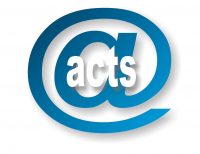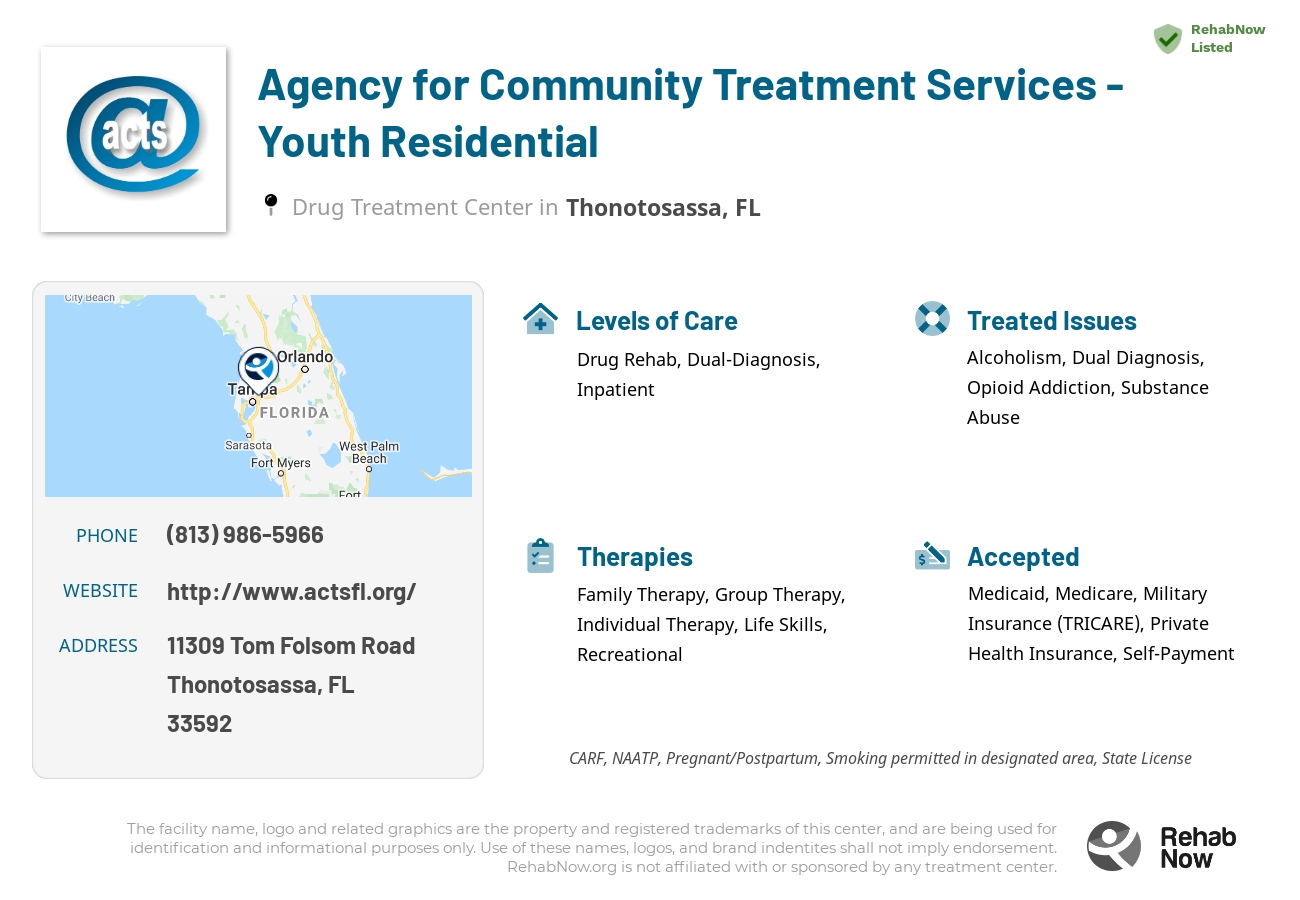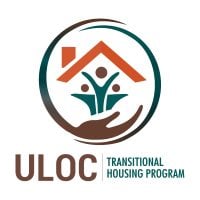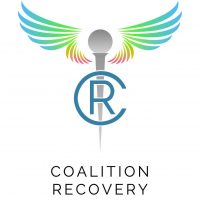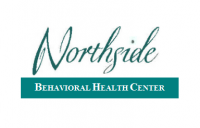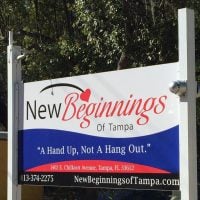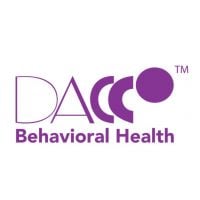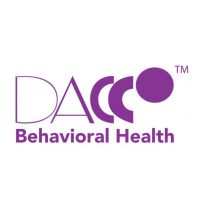Agency for Community Treatment Services - Youth Residential
Drug Rehab Center in Thonotosassa, Florida
The Agency for Community Treatment Services - Youth Residential is a drug rehab located in Thonotosassa, Florida which offers inpatient and residential levels of care and treats various addictions such as alcoholism, dual diagnosis, opioid addiction, substance abuse, and drug addiction while accepting private health insurance.
About Agency for Community Treatment Services - Youth Residential in Florida
Located in Thonotosassa, Florida, the Agency for Community Treatment Services - Youth Residential caters to adolescents aged 13-17 grappling with substance use and co-occurring disorders. This facility stands out with its alternative school program and a comprehensive approach to treatment that spans typically between three to six months, custom-tailored to each individual’s needs.
- Alternative Schooling: Facilitated by teachers from the Hillsborough County School Board, ensuring education continues during recovery.
- Comprehensive Treatment Plan: Includes 24-hour supervision, personalized therapy, life skills, and non-verbal therapies among others, for holistic care.
- Specialized Support: Offers psychiatric evaluations, medication management, and random drug screenings, alongside rigorous mental health services.
Accredited by CARF, the Agency for Community Treatment Services - Youth Residential assures a high standard of care and effectiveness in addiction treatment. It accepts private health insurance, making its specialized services for adolescents more accessible.
The facility addresses a broad spectrum of issues, including alcoholism, opioid addiction, substance abuse, and dual diagnosis cases, through a variety of treatment methods. These methods include individual, group, and family therapy sessions, coupled with 12-step support and life skills training for a thorough rehabilitation process.
Genders
Ages
Modality
Additional
Accreditations

CARF
The Commission on Accreditation of Rehabilitation Facilities (CARF) is a non-profit organization that specifically accredits rehab organizations. Founded in 1966, CARF's, mission is to help service providers like rehab facilities maintain high standards of care.
Conditions and Issues Treated
Substance Abuse + Addiction Treatment at Agency for Community Treatment Services - Youth Residential
A combination of treatments is often needed to treat drug abuse. Some addictions can be treated with counseling and support groups. In other cases, drug abuse can lead to a medical problem and require medical treatment. Treatment for drug addiction typically combines counseling and psychotherapy with medication and behavioral therapies.
A combination of treatments is often needed to treat drug abuse issues effectively. In the case of drug abuse, there is no easy answer or one-size-fits-all cure.
Opioid addiction has become a significant health problem in the United States. In 2015, there were 91 opioid overdose-related deaths per day, with a substantial increase in mortality rate in 2014.
When opioid addiction has reached a point where a person’s life becomes unmanageable, treatment options are available to help them get sober. Treatment that includes medical care with medications and counseling can help a user transition into sobriety.
When someone in struggles with both addiction and mental or emotional illness, this is considered a dual diagnosis. Dual diagnosis treatment can include therapy for these issues to happen simultaneously, which will allow either of them to be treated effectively.
Sometimes people who have suffered from addiction disorder also suffer from co-occurring disorders such as depression, anxiety, bipolar disorder, etc., making them “dual diagnoses.” Dual diagnoses require specialized treatment programs where drug and alcohol addiction are addressed along with psychiatric illnesses. Some rehabilitation facilities provide patients suffering from cooccurrences a program with highly integrated services and a clean environment with few distractions to help them succeed.
Levels of Care Offered
This center offers a variety of custom treatment tailored to individual recovery. Currently available are Drug Rehab, Dual-Diagnosis, Inpatient, Residential, with additional therapies available as listed below.
Inpatient treatment for alcoholism or drug addiction is an option that provides the addict with a supportive environment in which they can stop using. After detox, an inpatient treatment center provides a structured environment for the addict to recover from their addiction and begin taking steps toward a lifetime of sobriety.
This type of treatment is appropriate for addicts that are most in need of intensive care and supervision. This includes those who were unable to quit on their own, those who need more structure than they can get in outpatient treatment, and those whose addiction has led them into legal trouble or severe health problems.
Residential treatment programs are those that offer housing and meals in addition to substance abuse treatment. Rehab facilities that offer residential treatment allow patients to focus solely on recovery, in an environment totally separate from their lives. Some rehab centers specialize in short-term residential treatment (a few days to a week or two), while others solely provide treatment on a long-term basis (several weeks to months). Some offer both, and tailor treatment to the patient’s individual requirements.
Therapies & Programs
Because no single treatment is effective for all addicts, the goal of treatment and therapy should be to figure out what works best for each individual. Tolerance and withdrawal levels differ from person to person, affecting the treatment intensity required. Addiction treatment should aim to help addicts develop healthy coping mechanisms for dealing with their addiction and its underlying causes.
Family therapy is beneficial for people who are in addiction treatment services because it offers addicts the opportunity to work with their family members to better understand what led them to make choices that contributed to their addiction.
This type of therapy helps family members reach a deeper understanding of how they can best support their loved one during recovery. It also helps the addict better understand their own motivations and triggers that led them to turn to substance abuse.
Family therapy can help addicts in the following ways:
- Assists family members in processing difficult feelings so they don’t blame or resent recovering addicts
- Assists family members in understanding how addiction has impacted the addict and everyone who is involved with them
- Allows the addict to take responsibility for their actions, while encouraging improved communication skills
- Helps family members understand how to best support an individual in recovery so addicts don’t relapse again.
Group therapy can help build a stronger support system and give addicts in Thonotosassa, FL insight into their addiction that they gain through shared conversations. Group therapy occurs in a controlled group environment, exclusive of one on one meetings. This makes it safer for patients to feel comfortable sharing the struggles they’re going through and gaining perspective.
Life Skills Services assist addicts in their recovery by teaching them healthy coping mechanisms that will aid them in becoming sober, focussing on helping people enter into, and maintaining long-term sobriety. Drug Treatment Centers provide Life Skills Services at varying levels of intensity, specific to the needs and requirements of each patient.
The benefits of Life Skills Services offered at Agency for Community Treatment Services - Youth Residential:
- Restores hope and empowerment — Helps addicts believe that recovery is possible and instills a new confidence in their ability to achieve a positive, drug-free future
- Enhances family involvement — Encourages families to get involved in the recovery process and supports their understanding and encouragement of healthy behavior.
- Increases patient’s compliance — Helps patients take responsibility for and ownership of their recovery and encourages continued progress
- Reduces relapse rates — Encourages long-term abstinence and emphasizes the importance of establishing sober support systems.
Payment Options Accepted
For specific insurance or payment methods please contact us.
Is your insurance accepted?
Ask an expert, call (888) 674-0062
Agency for Community Treatment Services (ACTS) Associated Centers
Discover treatment facilities under the same provider.
- ACTS - Adult Addiction Receiving Facility (AARF) in Tampa, FL
- ACTS - Adult Outpatient in Tampa, FL
- ACTS - Keystone Residential Treatment Program in Tarpon Springs, FL
- ACTS - Juvenile Addiction Receiving Facility (JARF) in Tampa, FL
- Agency for Community Treatment Services - New Horizons in Mulberry, FL
Learn More About Agency for Community Treatment Services (ACTS) Centers
Additional Details
Specifics, location, and helpful extra information.
Thonotosassa, Florida 33592 Phone Number(813) 986-5966 Meta DetailsUpdated April 15, 2024
Staff Verified
Agency for Community Treatment Services - Youth Residential Patient Reviews
There are no reviews yet. Be the first one to write one.
Thonotosassa, Florida Addiction Information
Florida is one of the nation's epicenters for substance abuse and drug-related overdoses. In 2014, around 410,000 Florida residents were addicted to drugs and alcohol. Over the last 10 years, 12% of all deaths in the state were attributed to substance abuse. Treatment admissions for alcohol reached 24,329 patients in 2016, and 2.5% of Florida high school students admitted to using crack cocaine.
Treatment in Nearby Cities
- Palmetto Bay, FL (208.6 mi.)
- Middleburg, FL (142.3 mi.)
- Clewiston, FL (124.0 mi.)
- Alachua, FL (120.9 mi.)
- Orlando, FL (66.8 mi.)
Centers near Agency for Community Treatment Services - Youth Residential
The facility name, logo and brand are the property and registered trademarks of Agency for Community Treatment Services - Youth Residential, and are being used for identification and informational purposes only. Use of these names, logos and brands shall not imply endorsement. RehabNow.org is not affiliated with or sponsored by Agency for Community Treatment Services - Youth Residential.
